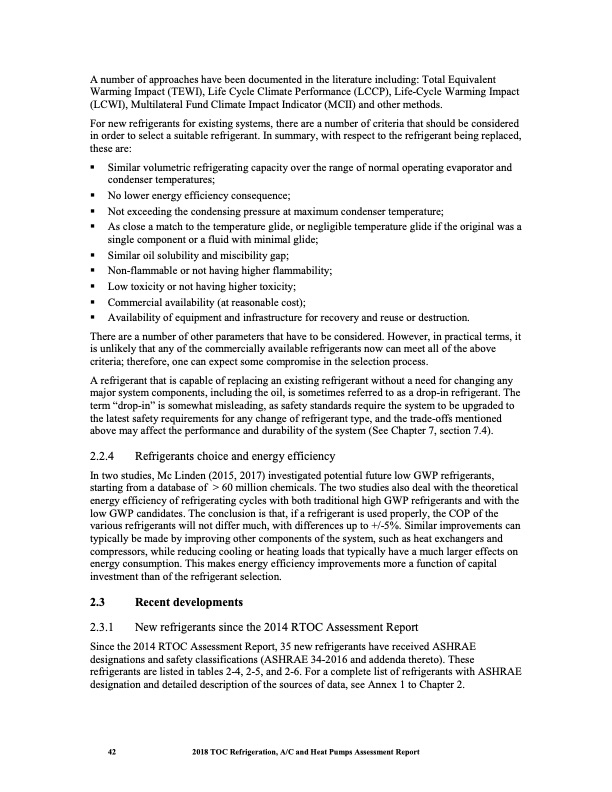
PDF Publication Title:
Text from PDF Page: 055
A number of approaches have been documented in the literature including: Total Equivalent Warming Impact (TEWI), Life Cycle Climate Performance (LCCP), Life-Cycle Warming Impact (LCWI), Multilateral Fund Climate Impact Indicator (MCII) and other methods. For new refrigerants for existing systems, there are a number of criteria that should be considered in order to select a suitable refrigerant. In summary, with respect to the refrigerant being replaced, these are: Similar volumetric refrigerating capacity over the range of normal operating evaporator and condenser temperatures; No lower energy efficiency consequence; Not exceeding the condensing pressure at maximum condenser temperature; As close a match to the temperature glide, or negligible temperature glide if the original was a single component or a fluid with minimal glide; Similar oil solubility and miscibility gap; Non-flammable or not having higher flammability; Low toxicity or not having higher toxicity; Commercial availability (at reasonable cost); Availability of equipment and infrastructure for recovery and reuse or destruction. There are a number of other parameters that have to be considered. However, in practical terms, it is unlikely that any of the commercially available refrigerants now can meet all of the above criteria; therefore, one can expect some compromise in the selection process. A refrigerant that is capable of replacing an existing refrigerant without a need for changing any major system components, including the oil, is sometimes referred to as a drop-in refrigerant. The term “drop-in” is somewhat misleading, as safety standards require the system to be upgraded to the latest safety requirements for any change of refrigerant type, and the trade-offs mentioned above may affect the performance and durability of the system (See Chapter 7, section 7.4). 2.2.4 Refrigerants choice and energy efficiency In two studies, Mc Linden (2015, 2017) investigated potential future low GWP refrigerants, starting from a database of > 60 million chemicals. The two studies also deal with the theoretical energy efficiency of refrigerating cycles with both traditional high GWP refrigerants and with the low GWP candidates. The conclusion is that, if a refrigerant is used properly, the COP of the various refrigerants will not differ much, with differences up to +/-5%. Similar improvements can typically be made by improving other components of the system, such as heat exchangers and compressors, while reducing cooling or heating loads that typically have a much larger effects on energy consumption. This makes energy efficiency improvements more a function of capital investment than of the refrigerant selection. 2.3 Recent developments 2.3.1 New refrigerants since the 2014 RTOC Assessment Report Since the 2014 RTOC Assessment Report, 35 new refrigerants have received ASHRAE designations and safety classifications (ASHRAE 34-2016 and addenda thereto). These refrigerants are listed in tables 2-4, 2-5, and 2-6. For a complete list of refrigerants with ASHRAE designation and detailed description of the sources of data, see Annex 1 to Chapter 2. 42 2018 TOC Refrigeration, A/C and Heat Pumps Assessment ReportPDF Image | Heat Pumps Technical Options

PDF Search Title:
Heat Pumps Technical OptionsOriginal File Name Searched:
RTOC-assessment-report-2018_0.pdfDIY PDF Search: Google It | Yahoo | Bing
CO2 Organic Rankine Cycle Experimenter Platform The supercritical CO2 phase change system is both a heat pump and organic rankine cycle which can be used for those purposes and as a supercritical extractor for advanced subcritical and supercritical extraction technology. Uses include producing nanoparticles, precious metal CO2 extraction, lithium battery recycling, and other applications... More Info
Heat Pumps CO2 ORC Heat Pump System Platform More Info
| CONTACT TEL: 608-238-6001 Email: greg@infinityturbine.com | RSS | AMP |